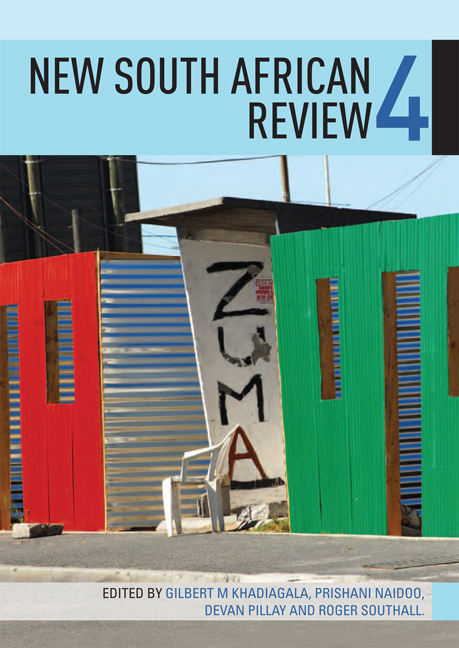Book contents
- Frontmatter
- Contents
- Preface
- Introduction: South Africa's fragile democracy: Twenty years on
- PART ONE ECOLOGY, ECONOMY AND LABOUR
- PART TWO POWER, POLITICS AND PARTICIPATION
- PART THREE PUBLIC POLICY AND SOCIAL PRACTICE
- Introduction
- Chapter 11 Why does Zimbabwe's school system out-perform South Africa's?
- Chapter 12 Higher Education in 2013: At many crossroads
- Chapter 13 Democracy without economic emancipation: Household relations and policy in South Africa
- Chapter 14 Prisons, the law and overcrowding
- PART FOUR SOUTH AFRICA AT LARGE
- Contributors
- Index
Chapter 14 - Prisons, the law and overcrowding
from PART THREE - PUBLIC POLICY AND SOCIAL PRACTICE
Published online by Cambridge University Press: 21 April 2018
- Frontmatter
- Contents
- Preface
- Introduction: South Africa's fragile democracy: Twenty years on
- PART ONE ECOLOGY, ECONOMY AND LABOUR
- PART TWO POWER, POLITICS AND PARTICIPATION
- PART THREE PUBLIC POLICY AND SOCIAL PRACTICE
- Introduction
- Chapter 11 Why does Zimbabwe's school system out-perform South Africa's?
- Chapter 12 Higher Education in 2013: At many crossroads
- Chapter 13 Democracy without economic emancipation: Household relations and policy in South Africa
- Chapter 14 Prisons, the law and overcrowding
- PART FOUR SOUTH AFRICA AT LARGE
- Contributors
- Index
Summary
‘Going to prison is like dying with your eyes open.’ Bernard Kerik, former New York City police commissioner
INTRODUCTION
This chapter is about a long-standing problem in the South African criminal justice sector that, despite an overhaul of the prison legislation after the enactment of the final Constitution, continues, twenty years on, to plague the Department of Correctional Services and, of course, those who are incarcerated in the country's prisons. I examine both the causes and the effects of overcrowding as well as the constitutional implications, and argue that currently the rights of inmates detained in overcrowded prisons are being infringed and that curative measures on the part of the state are needed urgently. I discuss what remedial measures are, or could be, available, some of which could be employed immediately, and others over the medium to long term.
A FEW PRELIMINARY POINTS
I use the term ‘inmates’ to refer to both sentenced offenders and those awaiting trial. The latter, to whom I shall refer as ‘remand detainees’, are detainees who have already been formally charged before a court, are awaiting trial, or who have not yet been sentenced and who are being detained in a prison. Approximately one-third of the prison population is composed of these remand detainees and they are thus a significant element in the problem of overcrowding (Judicial Inspectorate 2010/11). The term ‘overcrowding’ is used in this chapter as a description only of the ratio of inmates to rated capacity. Haney (2006) makes the important point that the term could include the extent to which a prison accommodates more inmates than its infrastructure can ‘humanely accommodate, meaning a prison without adequate medical facilities for its population could be “overcrowded” even though, technically, it is not accommodating more inmates than that for which it was designed’. Although it is likely that South African prisons are overcrowded in the broader sense, the statistical information available is not sophisticated enough to support an argument along such lines. So, in this chapter, we consider only the numbers of inmates.
PRISON LAW AND THE CONSTITUTION
Since the advent of South African democracy the law in respect of prisons and punishment has been reformed in significant ways. Reform was prompted, of course, by the interim and then final Constitutions, the latter adopted in 1996.
- Type
- Chapter
- Information
- New South African Review , pp. 256 - 270Publisher: Wits University PressPrint publication year: 2014

